- Home
- Maggie Stiefvater
Ballad Page 3
Ballad Read online
Page 3
She said it like it had a lot of O s in it: Noooooola. She was half-smiling in the smug sort of way that I liked better on my face.
“Are you sure you want to stick with that one?”
She studied her fingernails and bit at one. “It’s a woman’s prerogative to change her mind.”
“Are you a woman?” I asked.
Nuala shot a dark look at me. “Haven’t you heard that it’s rude to ask?”
“Right. How thoughtless of me. So, have we met?”
Nuala waved a hand at me. “Shut up, would you? I’m trying to listen.” She adjusted her seat way back and stared at the ceiling a second before closing her eyes. I had this horrible idea that she wasn’t listening to the music on the radio, but to some faraway music that only she could hear. I kept driving, silent, but I kept an eye on her. The afternoon sunlight came in through the side of the car and highlighted a galaxy of freckles on her cheeks. The freckles seemed incongruous, somehow: Very innocent. Very human. Then she opened her eyes and said, “So you’re a piper.”
This didn’t have to be a supernatural observation. Anybody who’d been on the sidewalk when I played for Bill would’ve been able to hear. Still, I couldn’t help but imagine a subtext beneath her statement. “Yes. An awesome one.”
Nuala shrugged. “You’re all right.”
I glanced at her; she was smiling, in a very pointy way. “You’re just trying to make me angry.”
“I’m just saying I’ve heard better.” Nuala turned her face to me and the smile vanished. “I listened to your conversation, piper. They’ve got nothing for you here. Would you like to be better at what you do?”
The prick of danger increased to a stab. “That’s a stupid question. You already know the answer, or you wouldn’t have asked.”
“I could help you.”
I narrowed my eyes, trying to choose my words. “How do you figure?”
Out of the corner of my eye, I saw her sit up straight and then, a moment later, I felt her breath in my ear. “By whispering secrets into your ear that would change your life.”
I leaned my head away from her before the scent of her breath could capture me. My goose bumps had goose bumps. “And you’d do this selflessly, I’m sure.”
“You know, I’d get hardly anything out of it, in comparison. You wouldn’t even notice. You’d become the best piper to ever live.”
“Right.” All sorts of warning stories of deals with devils and the like were running through my head, and now I was definitely rethinking my decision to get into the car with her. “Well, I’m flattered. But no.” We were getting close to the school now. I wondered what she’d do when we got there. “I’m happy with my level of awesomeness. Happy enough to work my way up on my own, anyway. Unless you have, like, a free, no-obligation trial subscription that I can cancel after thirty days without owing anything or giving you a credit card number.”
She showed me her teeth in a kind of grimace or snarl. “It’s very rude to turn down help from someone like me. Self-involved jerks such as yourself rarely get such offers.”
I protested. “I was nice about turning you down, though. You have to admit that, at least.”
“You didn’t even think about it.”
“I did. Now, did you hear that pause there? Just a second ago? That was me, thinking about it again. And the answer’s still no.”
She growled and shoved her feet into her giant clogs. “Stop the car. I’ll get out here.”
“What about school?”
Nuala’s fingers were claws on the door handle. “Don’t push me, James Morgan. Let me out and I won’t pop your head off.”
There was a ferocity to her voice that made me believe her. I stopped the car by the side of the road, trees close in on either side. Nuala fumbled with the door handle and then snapped at me, “Locks, you idiot!”
The doors had auto-locked. I hit the unlock button and she pushed the door open. Turning back to me, she fixed her blue eyes on me again. Her voice was scornful. “I think you lack the capacity to learn what I could teach you, anyway. Smug bastard.”
She slammed the door and I hit the gas before she could change her mind. I glanced in the rearview mirror, but all I saw was a whirl of dry leaves spinning up from the road.
Nuala
The blanket of yellow dazzles,
A frenetic sea of autumn glowing
Flowers upon a dying world, gifts for a yearly wake
Hiding behind summer-warm days,
The frost-bit nights are growing
Long with promise of the vicious harvest we take.
—from Golden Tongue: The Poems of Steven Slaughter
For some reason, the memory of that afternoon, the first day anyone had ever told me “no,” stuck in my head with excruciating detail. I could remember everything about it for the rest of my life. The too-hot interior of James’ car and the way that the worn cloth seat felt downy against the palm of my hand. The leaves outside the car, brilliant in their gaudy colors: the red-brown of the oaks was the same red-brown of his hair. The thick feeling in the back of my throat—anger. Real anger. It had been forever since I’d been angry.
It had been forever since I hadn’t gotten something I wanted.
I sulked until the sun blazed red just above the trees and the students returned to the dorms in knots of two, threes, fours. There were several that walked alone, hands shoved in pockets or gripping backpack straps, eyes on the ground. They would’ve been easy marks; being away from their family and friends was hard and these little lonely souls had only their music for company. They glowed faintly to me, blues and aquamarines and watery greens, all the color of my eyes. Maybe if it hadn’t been so soon after the last one, I would’ve been tempted. But I still felt strong, alive, invincible.
And there James was, in a group of four kids, which was all wrong. My marks never had friends—music was their life. Someone like him shouldn’t have had such an easy way with people. Shouldn’t have even wanted it. I would’ve doubted that it was him, despite his short-cropped auburn hair and his cocky bastard walk, but the fierce splash of yellow—my favorite color, for the record—that glowed inside him screamed music music music.
It was all I could do not to go rushing down there and make him want to take my deal. Or hurt him. Very badly. I had a couple of ideas that would take quite awhile to finish.
Patience. Get a grip.
So, instead, I fell into step behind his group of friends, unseen. I guess I could’ve been seen if anyone had thought to look really hard in the right way, but no one did. No one ever did, these days, though I’d heard from other faeries that it hadn’t always been this way. The few kids that felt something of me now and glanced up saw only a whirl of fall leaves racing along the edge of the sidewalk, climbing into the air before spiraling back down to the ground. That was me, always, the invisible shiver at twilight, the intangible lump in the back of your throat, the unbidden tear at thoughts long forgotten.
As the kids walked past the dorm buildings, the group dwindled to two as the girls disappeared into their dorm. I could get closer then, close enough that the glow of him reflected on my twilight skin and made me want to touch him and pull bright strings of music out of his head. If only he’d said yes.
James and the remaining boy were talking about vending machines. One of them, a boy whose chief characteristic was an innocent, smiling face, was quoting statistics about how many people get killed by vending machines tipping over on them.
“I don’t think they pulled the machines onto themselves,” James was saying.
“They showed video,” the round kid said.
“No, I think there’s probably an avenging vending machine angel that pushes them onto grabby bastards who are bad sports about losing their money.” James made a pushing motion, a p
anicked expression, and a squashing sound in quick succession. “Lesson learned, bucko. Next time, just accept that you’ve lost your fifty cents.”
Round-o: “Except there wouldn’t be a next time.”
“How right you are. Dying would prohibit one from acting upon the lesson they’d learned. Scratch that. Let the record show that vending machine tragedies are not morality tales but a form of natural selection.”
Round kid laughed, then looked past James at something. “Hey, man, there’s a chick staring at you.”
“Is there ever not?” James asked, but he turned to look anyway, past me at someone else. The yellow inside him flashed, twisted, flared toward me as if begging for me to turn it into something else. But his eyes didn’t find me; they instead rested on a pale girl. Black hair, face washed out in the artificial light of a streetlight, fingers plucking anxiously at her backpack strap. There was something missing from James’ voice when he told Round-o, “Hey, I’ll be up in a second, okay? She’s from my old school.”
Round-head duly dispatched, James made his way through the circles of streetlight to where the girl stood. She had faint threads of orange glow running through her, like neon taffy, making me think that she would’ve made a good pupil if I hadn’t liked mine young, handsome, and male.
James’ voice was very brave, all funny and strong, even though the thoughts I could catch of his were chaotic. “Hey, crazy, what’s up?”
She smiled back at him, annoyingly pretty—I didn’t really care for attractive members of my own gender—and made a weird, crumpled, rueful face. Again, annoyingly cute. “Just getting ready to go up to my room. I came over this way because I always, um, never, because I never saw the fountain when it was lit up. And I wanted to.”
Yeah, whatever. So you came over to see him and don’t want to say it. Right. Stop being coy. I glared at her. James half-cocked his head in my direction, as if listening, and I skirted a few feet away from them. But at my sudden movement, the girl’s eyes lifted abruptly, following me, frowning as if she saw me. Crap. I leaned down as if I was tying my shoe, like I was a real student and I was actually visible to everyone. Her eyes didn’t focus on me after I’d bent down—she couldn’t quite see me. She must have some of the second sight. That annoyed me too.
“Dee,” James said. “Earth to Dee. Calling planet Dee. Houston, our communication lines seem to be down. Dee, Dee, do you read me?”
Dee pulled her eyes away from me and back to James. She blinked, hard. “Um. Yes. Sorry about that. I didn’t get enough sleep last night.” She had a very beautiful voice. I thought she must be quite a good singer. I finished fake-tying my shoe and started to walk very slowly toward the fountain, to hide myself in the water. Behind me, I heard James say something and Dee laugh, a relieved laugh, as if it had been awhile since she’d heard something funny and she was glad humor still existed.
I lay down in the fountain—invisible, I couldn’t feel the wetness—and looked up at the darkening sky, the water rippling over my vision. I felt safe in the water, utterly invisible, utterly protected.
Dee and James walked to the edge of the satyr fountain and stood directly over the top of me, close to each other but not touching, separated by some invisible barrier they had constructed before I’d arrived on the scene. James cracked jokes the whole time, one meaningless, funny line after another, making her laugh again and again so that they didn’t have to talk. His agony would’ve made a gorgeous song. I had to find a way to make him take my deal.
Dee and James stared at the satyr, who grinned back at them, permanently dancing upon a tiny oak leaf in the middle of the water. “I’ve heard you practicing,” Dee said.
“Stunned by my magnificence?”
“Actually, I do think you’ve gotten better since the last time I heard you. Is that possible?”
“Entirely possible. The world is a wonderful and strange place.” He hesitated. Lying in the water, I could read his thoughts more easily. I saw his brain form the question, how are you holding up here? But instead he said, “It’s getting colder at night.”
“Friggin’ freezing in our room sometimes!” Dee’s voice was too enthusiastic, glad of an easy conversation. “When do they turn on the heat, anyway?”
“It’s probably a good thing they haven’t. If they turned on the heat now, it’d be hot enough to toast marshmallows in the rooms during the day.”
“That’s true. It’s still really warm in the afternoon, isn’t it? I guess it’s the mountains.”
I saw James struggle with his words before he said them, the first deeply sincere statement he’d made since finding her underneath the streetlight. “The mountains are gorgeous, aren’t they? They kind of make me sad for some reason, looking at them.”
Dee didn’t reply or react. It was like if he wasn’t saying something funny, he wasn’t speaking at all.
She moved away from him, around the edge of the fountain. He didn’t follow. Dipping her hand in the water, close to my feet, she said, “This fountain’s really weird. Why is he smiling like that?”
James reached over and patted the satyr’s butt. “Because he’s naked.”
“I’m just glad he’s in front of your dorm instead of the girls’. I think he’s a nasty little piece of work.”
“I’ll deface him for you, if you like,” James offered.
She laughed. I could almost imagine her singing when she laughed. “That’s okay. But I’d better get inside. Don’t want to be caught by that crazy teacher again, after curfew.”
He reached a hand toward her like he was going to take her hand, or her backpack, or touch her arm. He said, “I’ll walk you back.”
“It’s okay. I’m going to run,” Dee said. “I’ll see you tomorrow?”
The line of his shoulders seemed tired all of a sudden and his hand went into his pocket. “Indubitably.”
Dee flashed a smile at him and pelted back toward the girls’ dorm, backpack flapping against her body as she ran. James stayed by the fountain long after she’d disappeared, motionless as the satyr, his close-cut hair turning redder in the sunset light and his eyes half shut. I lay in the water and waited.
Long minutes passed, the sun slowly burning down toward the trees, and I kept looking at that gold glow that flickered inside him, the promise of creative greatness. Why hadn’t he said yes? Was it only because he’d turned me down that I now wanted him so badly? I could make him incredible. He could make me warm, alive, awake.
I’d give him a dream. That’s what I’d do. I’d show him just a little of what I could do, and next time he saw me, he wouldn’t be able to say no.
Above me, James started. He had his head cocked, listening like when he’d sensed me before, only now he heard something else.
The thorn king. I heard the melody begin to ripple across the hills as he began his journey across them. My ears had barely registered the sound, but when I blinked, James was gone. I hurriedly pushed myself out of the water—the surface moved in slow concentric waves around me—and I saw James, a dim figure in the darkness, running flat out like his life depended on it. Running toward the antlered king and his slow song for the dead. Who ran to meet death?
Long after James had traded the hills behind Thornking-Ash for his dorm room, I made my own way to the hills. I wasn’t interested in the antlered king’s music, though. It was faerie music that drew me now—it sounded like a dance, as improbable as that was.
I had never liked the dances. If there was one thing in the history of the world that had been invented to make me feel like a complete outsider, it was the dances the faeries held inside faerie rings. And this dance, on the biggest hill behind Thornking-Ash School, was no different—but it was ten times bigger than any dance I had ever seen. And no faerie, with the exception of myself, of course, could touch iron; mere proximity to it drove most faeries far u
nder the hills and into isolated stretches of countryside. So no matter how tempting the music of the Thornking-Ash School might be to my kind, the invisible iron that reinforced it and the shimmering cars in the parking lots should’ve rendered it a faerie no-fly zone.
But there were hundreds of faeries of every size and shape, from the tall, lovely court fey, who I expected to see, to the short, ugly hobmen, who I didn’t—they rarely ventured out from their holes and their drudgery to come to the dances. They all danced in twos and threes, touching each other’s hair, moving their bodies as one, all beautiful while dancing.
Hanging back a few dozen feet, up to my waist in the dry field grass, I brushed my palms over the seed tops and sighed. I wasn’t thrilled to see any of them. I had been hoping to have Thornking-Ash to myself.
But their music called to me, pulling at my body, irresistible. The longer I stayed there, listening to its pulsing rhythm, the more I knew that I had to go and feel it for myself.
The dancers didn’t interest me, with the impossible shapes they made of their bodies and the sensuality of skin touching skin. It was the musicians I headed toward. A lithe, beautiful boy faerie was all wrapped around a skin drum on his lap and it was he who gave the dance its hypnotic, primal heartbeat. There was a haunting fiddler who scratched and wailed on his fiddle, another faerie who shook a tambourine in perfect counterpoint to the booming drum, and a flutist who called us to dance with frightening, frantic urgency. But that drummer—the one who could make his drum sound like water dropping into a bucket or like the footfalls of a giant or like rain scattering on a roof—he was the one to watch. He was the one who could make you forget yourself.
“Dance, lovely?” a big-footed trow with a face like a shovel caught my hand. No sooner had he touched my fingers than he released them.
I sneered at him. “Yeah, I didn’t think you wanted any of that.”

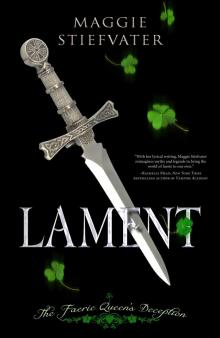 Lament: The Faerie Queens Deception
Lament: The Faerie Queens Deception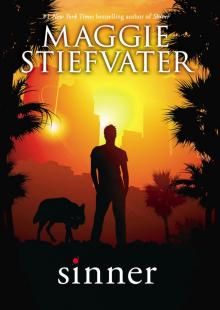 Sinner
Sinner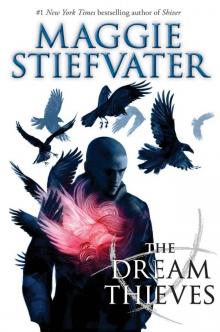 The Dream Thieves
The Dream Thieves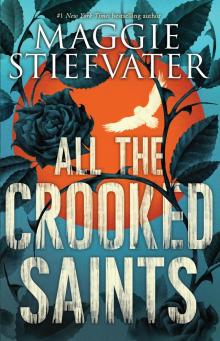 All the Crooked Saints
All the Crooked Saints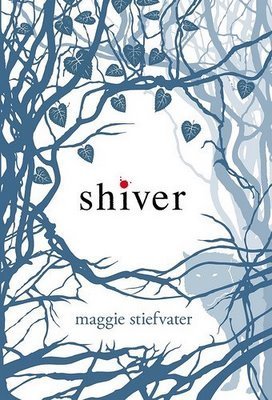 Shiver
Shiver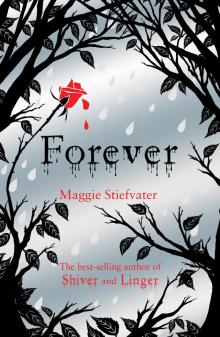 Forever
Forever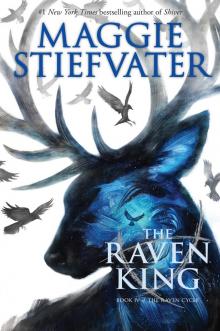 The Raven King
The Raven King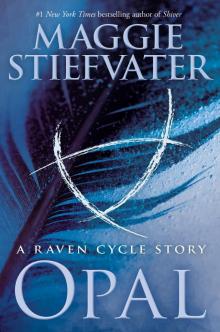 Opal
Opal Linger
Linger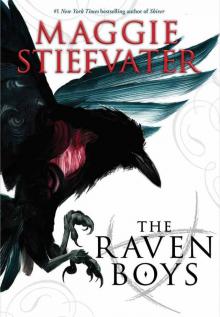 The Raven Boys
The Raven Boys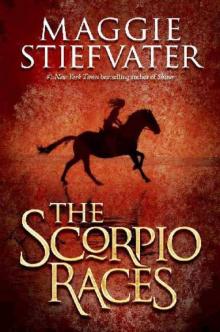 The Scorpio Races
The Scorpio Races Hunted
Hunted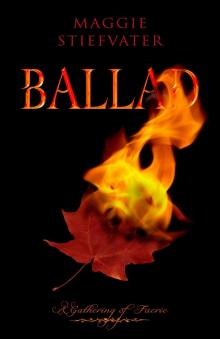 Ballad: A Gathering of Faerie
Ballad: A Gathering of Faerie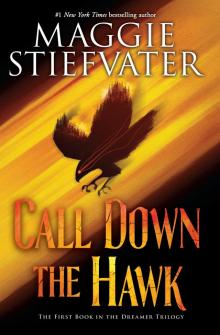 Call Down the Hawk
Call Down the Hawk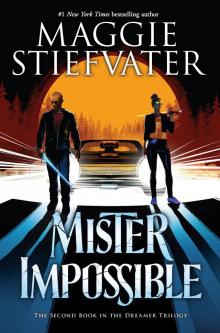 Mister Impossible
Mister Impossible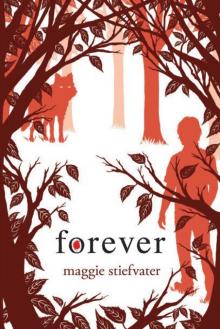 Wolves of Mercy Falls 03 - Forever
Wolves of Mercy Falls 03 - Forever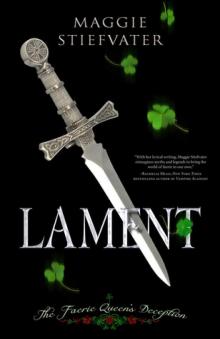 Lament
Lament![Maggie Stiefvater - [Wolves of Mercy Falls 02] Read online](http://i1.bookreadfree.com/i1/04/04/maggie_stiefvater_-_wolves_of_mercy_falls_02_preview.jpg) Maggie Stiefvater - [Wolves of Mercy Falls 02]
Maggie Stiefvater - [Wolves of Mercy Falls 02]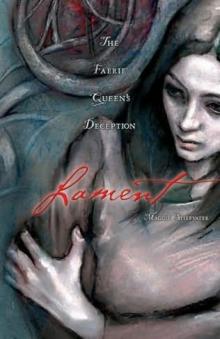 Lament: The Faerie Queen's Deception
Lament: The Faerie Queen's Deception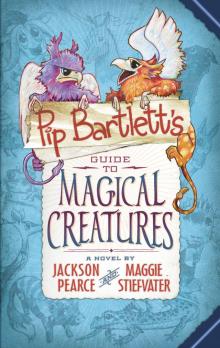 Pip Bartlett's Guide to Magical Creatures
Pip Bartlett's Guide to Magical Creatures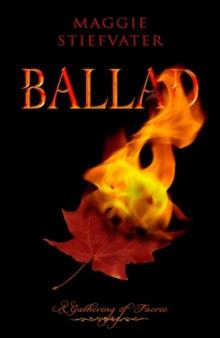 Ballad
Ballad